Atlanta Chinese Dance Company
presented
Back to the Roots
***click above for program synopsis***
on
Saturday, April 1, 2006 at 7:30 PM
Sunday, April 2, 2006 at 3:00 PM
at
Performing Arts Center at Gwinnett Center
Duluth, Georgia
Staged and Directed by:
Hwee-Eng Y.
Lee
Guest Artists:
Tara Lee, Atlanta Ballet
Tamila, Atlanta Ballet
Hangdong Xu, Dance China NY
Additional Artists:
Kerry Lee
Hui-Ju Young
Photographers:
Michael Merritt
Lander Stoddard
EXPECTING
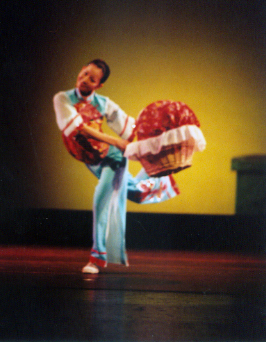
.jpg) This
Tao Li Cup dance competition award-winning folk dance, of the Han majority
ethnic group (92% of the total population) in China, depicts a young lady who is
pregnant with her first child. She is restless, anxiously counting down
the days as she laughs to herself about the thought of being a mother. The
dancer utilizes the fan as a metaphor for both the child and for the clothes she
is sewing for her child. This dance is in the style of "Yang Ge," which
originated from the movements of farmers.
This
Tao Li Cup dance competition award-winning folk dance, of the Han majority
ethnic group (92% of the total population) in China, depicts a young lady who is
pregnant with her first child. She is restless, anxiously counting down
the days as she laughs to herself about the thought of being a mother. The
dancer utilizes the fan as a metaphor for both the child and for the clothes she
is sewing for her child. This dance is in the style of "Yang Ge," which
originated from the movements of farmers.
Choreography: Beijing Dance
Academy
Mother: Eugenie Ooi
(Saturday), Hoyi Chan (Sunday)
[Top of page]
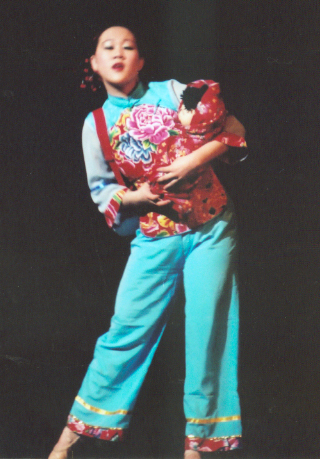 FROM
CHINA TO AMERICA
FROM
CHINA TO AMERICA
Shortly
after the baby was born, the mother decides to immigrate to America, leaving
everything behind except her newborn daughter, her toy drum, and her precious
memories from China. As she travels, she is confused, wondering both where
to catch her boat to America and where her new life will take her.
Choreography: Hwee-Eng Y. Lee
Mother: Eugenie Ooi (Saturday), Hoyi Chan (Sunday)
[Top of page]
A
GLIMPSE OF MOTHER'S PAST
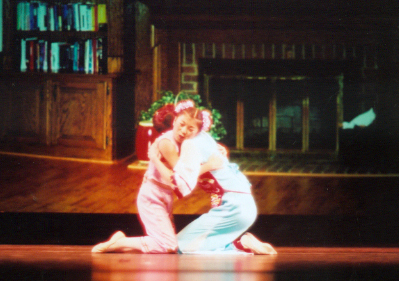
.jpg) The
daughter is now a young child, and the mother begins to pass on her Chinese
heritage to her daughter in America. She gives her daughter her toy drum,
her only materialistic possesion from her motherland. The daughter happily
plays with her new toy as she listens to her mother's stories of China.
The
daughter is now a young child, and the mother begins to pass on her Chinese
heritage to her daughter in America. She gives her daughter her toy drum,
her only materialistic possesion from her motherland. The daughter happily
plays with her new toy as she listens to her mother's stories of China.
Choreographer for Mother-Daughter Sections: Hwee-Eng Y. Lee
Choreographer for Mother in Flashback: Beijing Dance Academy
Mother: Eugenie Ooi (Saturday), Hoyi Chan (Sunday)
Daughter: Sophie Archer (Saturday), Kate Zahniser-Word (Sunday)
Mother in Flashback: Kateri Goodwin (Saturday), Anna Meyer (Sunday)
[Top of page]
RED
RIBBON DANCE
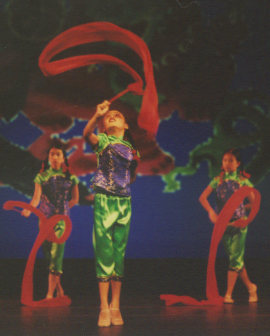 Traditionally,
red is the symbol of happiness. For centuries, the Chinese have taken
great pride in producing beautiful silk ribbons. Ribbon dancing originated
from Chinese opera and has been preserved since the Han dynasty (206 BC-24 AD).
It has since become a Han ethnic tradition, commonly performed at celebrations
such as Chinese New Year.
Traditionally,
red is the symbol of happiness. For centuries, the Chinese have taken
great pride in producing beautiful silk ribbons. Ribbon dancing originated
from Chinese opera and has been preserved since the Han dynasty (206 BC-24 AD).
It has since become a Han ethnic tradition, commonly performed at celebrations
such as Chinese New Year.
Choreography: Hwee-Eng Y. Lee
Dancers: Emily Backer, Mei-Jing Bernard, Laura Brockmann, Marjorie Peace
Huan Chamberlain, Claire Chang, Sabrina
Chin, Ruby Freeman, Lacey Krakowiak, Rachel Leong, Alice Y. McCurley, Penny
Young
[Top of page]
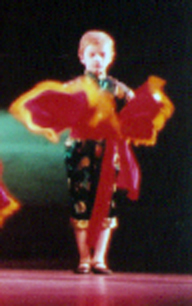 NORTHEAST
YANG GE
NORTHEAST
YANG GE
This Han folk dance is a typical example of "Yang Ge." The movements of Yang Ge originated from farmers in China. It
is usually performed during celebrations such as harvest time or Chinese New
Year. The dancers' twirling of the handkerchiefs creates the special
effect of the dance. It is also representative of the Yang Ge of
northeastern China.
Choreography: Hwee-Eng Y. Lee
Dancers: June Brenner, Carolyn Butler, Freda Chen, Katherine Do, Andrew
Ellis, Monica Ho, Claire Liu, Anna Marianchuk, Jade Phillips, Anna Rappaport
[Top of page]
JIAOZHOU
FAN DANCE
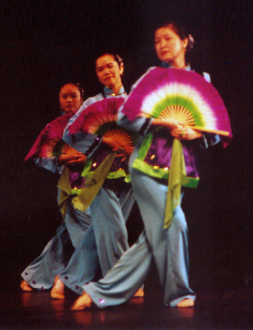 A
popular Han folk dance originating from the Shandong province in northern China,
this dance is also a type of Yang Ge. The special way of coordinating the
fan and scarf creates the beauty of this Han folk dance. The beauty of
spring is symbolized by the grace of the ladies.
A
popular Han folk dance originating from the Shandong province in northern China,
this dance is also a type of Yang Ge. The special way of coordinating the
fan and scarf creates the beauty of this Han folk dance. The beauty of
spring is symbolized by the grace of the ladies.
Choreography: Wang Mei
Dancers: Nancy Chen, Debbie Ellis, Jessica Kouch, Agate Lip, Iyabo
Shabazz, Shu Wu, Shu-Fen Yang, Yinghui Zhong
[Top of page]
PANDA
DANCE
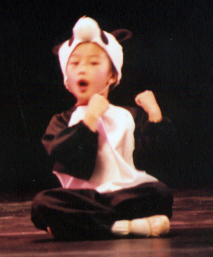
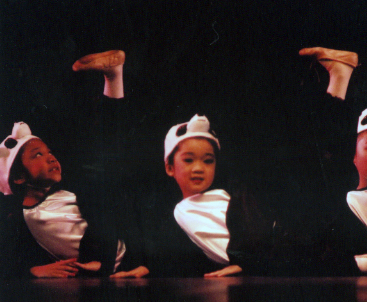 Pandas
are an endangered species. It is a treasure of China. They live in
the bamboo forests of central China. This dance depicts the simple, daily
lives of the adorable pandas.
Pandas
are an endangered species. It is a treasure of China. They live in
the bamboo forests of central China. This dance depicts the simple, daily
lives of the adorable pandas.
Choreography: Hwee-Eng Y. Lee
Dancers: Tia Bi, Yi-Shan Bernard, Sarah Anne Marie Goodwin, Julie Hon,
Hilary Hsieh, Kaya Moon Lee, Mia Mercaldo, Emily Ng, Nia Nguyen, Emily Ye,
Andrew Young
[Top of page]
MONGOLIAN
DANCE: CHOPSTICKS DANCE
.jpg)
 Inner Mongolians live on the vast prairies in northern
China. Many of the people live as shepherds. Their traditional
culture has a close relationship with sheep, horses, and eagles. In this
Tao Li Cup dance competition award-winning piece, the dancer beats bundles of
chopsticks, a typical prop of traditional Mongolian dance, in intricate patterns
across her body.
Inner Mongolians live on the vast prairies in northern
China. Many of the people live as shepherds. Their traditional
culture has a close relationship with sheep, horses, and eagles. In this
Tao Li Cup dance competition award-winning piece, the dancer beats bundles of
chopsticks, a typical prop of traditional Mongolian dance, in intricate patterns
across her body.
Choreography:
Arts School of Inner Mongolia University
Dancer: Kerry Lee
[Top of page]
YI
DANCE: SAI-LO-SAI
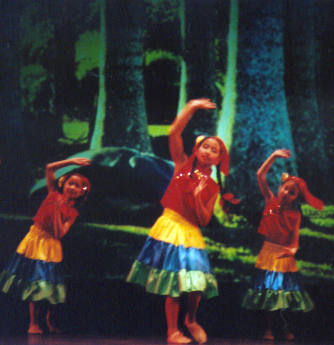 The Yi people is one of the 56 minority who mostly live in
the southwestern part of China in provinces such as Sichuan, Yunnan, and
Guangxi. Yi women wear laced or embroidered jackets and pleated long
skirts hemmed with colorful multi-layer laces. They worship fire, and the
torch festival is one of the important customs. The ancestors of the Yi
ethnic group can be traced back to the Qiang people in northwest China.
They have since migrated south and joined the local southwest aborigines to form
the Yi ethnic group as it is known today.
The Yi people is one of the 56 minority who mostly live in
the southwestern part of China in provinces such as Sichuan, Yunnan, and
Guangxi. Yi women wear laced or embroidered jackets and pleated long
skirts hemmed with colorful multi-layer laces. They worship fire, and the
torch festival is one of the important customs. The ancestors of the Yi
ethnic group can be traced back to the Qiang people in northwest China.
They have since migrated south and joined the local southwest aborigines to form
the Yi ethnic group as it is known today.
Choreography:
Nanjing "Xiao Hong Hua" Arts Troupe
Dancers: Emily Backer, Mei-Jing Bernard, Laura Brockmann, Marjorie Peace
Huan Chamberlain, Claire Chang, Sabrina Chin, Ruby Freeman, Lacey Krakowiak,
Rachel Leong, Alice Y. McCurley, Penny Young
[Top of page]
DAI
DANCE: WATER SPRINKLING FESTIVAL
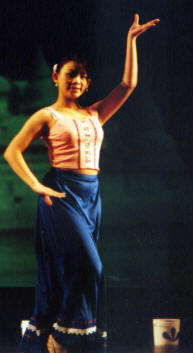 The Dai, one
of the fifty-six minority ethnic groups in China, live mostly in the Yunnan
province, located in southwestern China. Since they live in close
proximity to Myanmar, the style of the Dai dance is influenced by the Burmese.
Bouncy knees and angular arms are special characteristics of this type of dance.
The water sprinkling festival is unique to Dai culture. During the
festival, people carry buckets or basins to splash water on each other. It
is an event that is attended by a large number of people. It is believed
that the more water one is splashed with, the happier one will be. This
dance was originally choreographed for ACDC by a Dai woman Tang Yebi
The Dai, one
of the fifty-six minority ethnic groups in China, live mostly in the Yunnan
province, located in southwestern China. Since they live in close
proximity to Myanmar, the style of the Dai dance is influenced by the Burmese.
Bouncy knees and angular arms are special characteristics of this type of dance.
The water sprinkling festival is unique to Dai culture. During the
festival, people carry buckets or basins to splash water on each other. It
is an event that is attended by a large number of people. It is believed
that the more water one is splashed with, the happier one will be. This
dance was originally choreographed for ACDC by a Dai woman Tang Yebi
Staged by
Hwee-Eng Y. Lee after Yang Yebi
Dancers: Stephanie Chi, Catherine Chu, Karen Ho, Stephanie Hu, Allison
Kwan, Tiffany Liu, Lindsey Lue, Michelle McIntire, Julia Shyu, Tanya Su, Alice
Yee, Amy Yee
[Top of page]
DAI DANCE: FISH DANCE
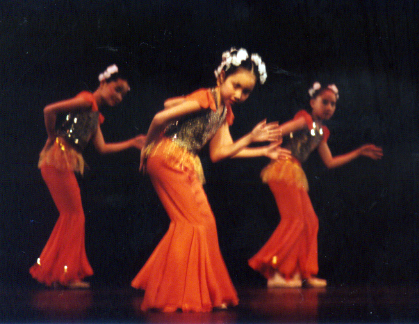
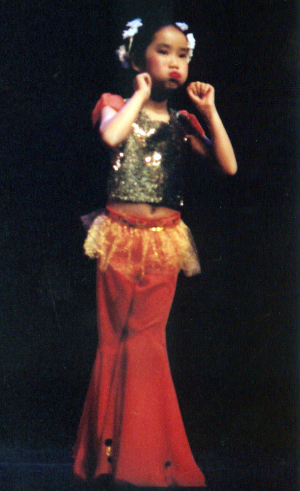 The
Dai depend on the river, where they wash their clothes and bathe. This
leads to their passion for fish. This dance was orginally choreographed
for ACDC by a Dai woman Tang Yebi.
The
Dai depend on the river, where they wash their clothes and bathe. This
leads to their passion for fish. This dance was orginally choreographed
for ACDC by a Dai woman Tang Yebi.
Staged by Hwee-Eng Y. Lee
after Tang Yebi
Dancers: Madeleine Morgan
Lan Harris (lead), Sophie Archer, Christy Chang, Vera Chang, Kateri Goodwin,
Molly Herman-Gallow, Leslie Lue, Cynthia McIntire, Anna Meyer, Christie Sui,
Kate Zahniser-Word
[Top of page]
CHINESE OPERA GIRLS
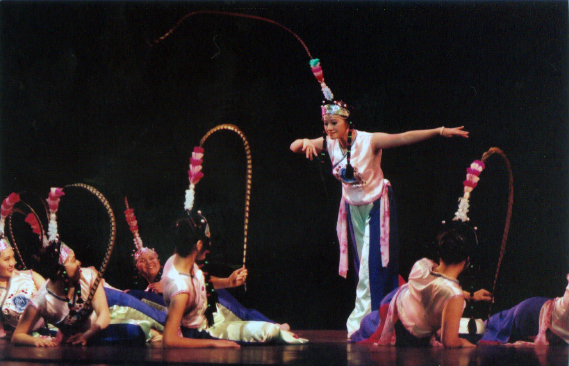
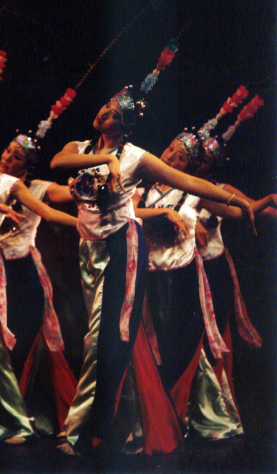 This
Tao Li Cup award-winning Han dance depicts the beauty of young traditional
Chinese opera ladies. In Chinese opera terminology, "hua dan" represents a
feisty, flirtatious young woman. This dance, in which dancers wear only
one long feather on their heads, is a parody of the long-standing tradition that
female warriors wear two long feathers on their heads
This
Tao Li Cup award-winning Han dance depicts the beauty of young traditional
Chinese opera ladies. In Chinese opera terminology, "hua dan" represents a
feisty, flirtatious young woman. This dance, in which dancers wear only
one long feather on their heads, is a parody of the long-standing tradition that
female warriors wear two long feathers on their heads
Choreography:
Sichuan Arts School
Dancers:
Penny Wang (lead), Hoyi Chan,
Emery Chang, Tzu-Wei Hsu, Queena Kou, Eugenie Ooi, Amanda Phingbodhipakkiya,
Tiffany Soo, Joann Wang, Sandy Sun
[Top of page]
CHIME
OF THE BELLS
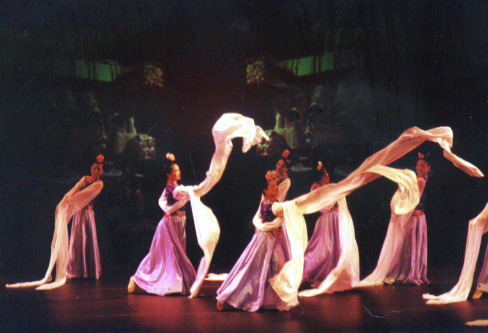
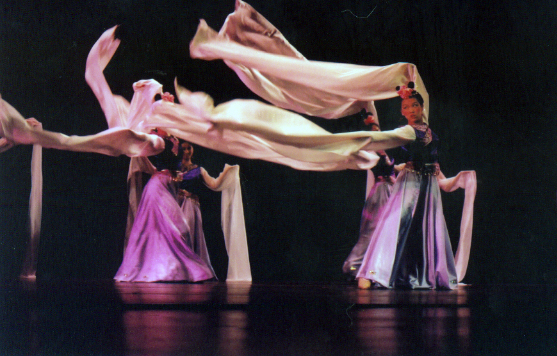 Th
Th
is
classical Chinese dance was inspired by the archaeologists who discovered a tomb
that dates back to the Warring States period some 2,400 years ago. This
palace banquet music is based on the folk melodies of Hubei. It shows the
grand entertainment in the palace with flowing, graceful long sleeves.
Choreography:
Hubei Province Song and Dance Troupe
Lead Dancers: Grace Ho (Saturday and Sunday), Catherine Stoddard and
Cindy Ye (Saturday), Deanna Joe and Kimberly Wu (Sunday)
Group Dancers: April Huang, Deanna Joe (Saturday), Dana Lee, Catherine
Stoddard (Sunday), Melissa Ting, Ginger Tsai, Jennifer Wang, Lacey Wen, Kimberly
Wu (Saturday), Cindy Ye (Sunday)
[Top of page]
DUNHUANG
DANCE: FLYING CELESTIALS
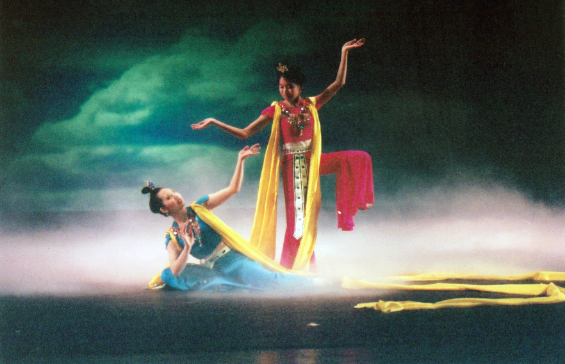 Dunhuang
music and dance developed during the Tang dynasty, one of the richest periods in
Chinese art history. The classical Dunhuang dance style developed during
the introduction of Buddhism into China and shows an Indian influence.
This dance depicts fairies flying in the heavens, watching the people on earth
below.
Dunhuang
music and dance developed during the Tang dynasty, one of the richest periods in
Chinese art history. The classical Dunhuang dance style developed during
the introduction of Buddhism into China and shows an Indian influence.
This dance depicts fairies flying in the heavens, watching the people on earth
below.
Choreography: Chen Ailian
Dancers: Queena Kou and Amanda Phingbodhipakkiya
[Top of page]
WOMAN
WARRIOR
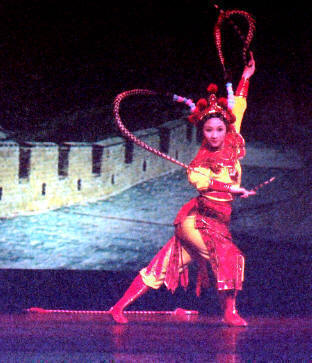
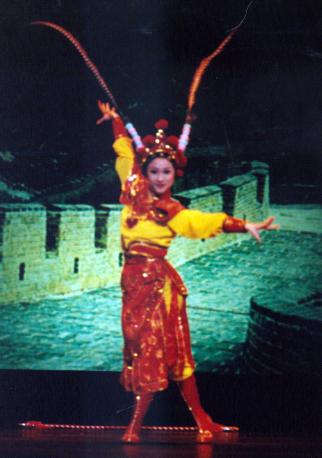 Part
of classical Chinese dance technique comes from traditional Chinese opera.
This dance portrays a traditional heroic Chinese woman. In Chinese opera,
this character typically wears full armor and long feathers in her hat.
Practicing control of the weapon shows her determination to defend her country.
Part
of classical Chinese dance technique comes from traditional Chinese opera.
This dance portrays a traditional heroic Chinese woman. In Chinese opera,
this character typically wears full armor and long feathers in her hat.
Practicing control of the weapon shows her determination to defend her country.
Choreography: Yong Jia Chen
Dancer: Hui-Ju Young
[Top of page]
BUTTERFLY LOVERS' CONCERTO
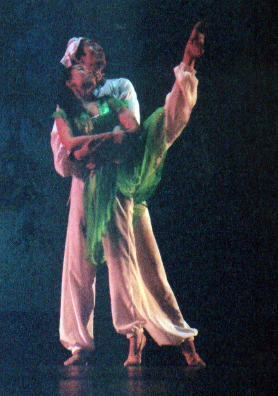
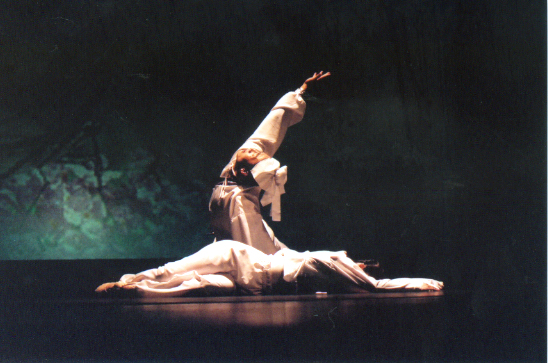 Butterfly
Lovers' Concerto is often nicknamed the Chinese version of Romeo and Juliet.
In the story, Zhu Yingtai disguised herself as a boy to study in Hangzhou, where
she met Liang Shanbo. They fell in love, but Zhu's father already arranged
for her to marry another man. Liang died of a broken heart, and when Zhu
mourned at Liang's tomb, the tomb burst open due to thunder. Zhu threw
herself into the grave, and the young couple transformed into butterflies in
heaven.
Butterfly
Lovers' Concerto is often nicknamed the Chinese version of Romeo and Juliet.
In the story, Zhu Yingtai disguised herself as a boy to study in Hangzhou, where
she met Liang Shanbo. They fell in love, but Zhu's father already arranged
for her to marry another man. Liang died of a broken heart, and when Zhu
mourned at Liang's tomb, the tomb burst open due to thunder. Zhu threw
herself into the grave, and the young couple transformed into butterflies in
heaven.
Choreography:
Zhang Jianming
Dancers: Tara Lee and
Tamila (Guest Artists, Atlanta Ballet)
[Top of page]
REBELLION
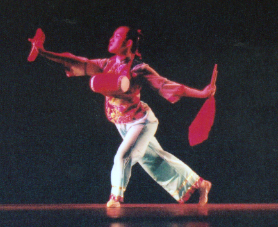
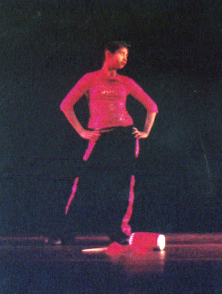 Now
that the daughter is a teenager, she longs to fit in with her American
counterparts. Trading her traditional Chinese outfit for her latest
fashions and her mother's stories for American hip hop music, the girl renounces
her Chinese heritage as an oddity that she wishes to shut out of her mind.
She kicks the toy drum in anger.
Now
that the daughter is a teenager, she longs to fit in with her American
counterparts. Trading her traditional Chinese outfit for her latest
fashions and her mother's stories for American hip hop music, the girl renounces
her Chinese heritage as an oddity that she wishes to shut out of her mind.
She kicks the toy drum in anger.
Choreographer: Hwee-Eng Y.
Lee
Mother: Eugenie Ooi
(Saturday), Hoyi Chan (Sunday)
Daughter: Allison Kwan
(Saturday), Catherine Chu (Sunday)
[Top of page]
IN
MOURNING
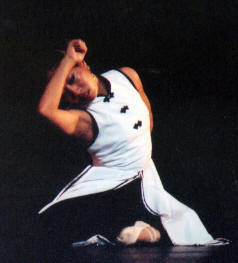
.jpg) Just
as the daughter begins to mature, her mother passes away, leaving the daughter
pondering everything her mother taught her about China. She goes back to
the drum, the symbol of her mother's love and only connection to her homeland.
Determined to seek the answers to all of the questions she never bothered to ask
and to fully understand everything the drum embodies, she vows to travel to
China to see firsthand what her mother spent a lifetime trying to teach her.
This dance incorporates ballet and modern dance with Chinese dance to reflect
the daughter's influences from both western and eastern cultures.
Just
as the daughter begins to mature, her mother passes away, leaving the daughter
pondering everything her mother taught her about China. She goes back to
the drum, the symbol of her mother's love and only connection to her homeland.
Determined to seek the answers to all of the questions she never bothered to ask
and to fully understand everything the drum embodies, she vows to travel to
China to see firsthand what her mother spent a lifetime trying to teach her.
This dance incorporates ballet and modern dance with Chinese dance to reflect
the daughter's influences from both western and eastern cultures.
Choreographers: Hwee-Eng
Y. Lee and Kerry Lee
Daughter: Kerry Lee
Mother in Flashback: Eugenie Ooi (Saturday), Hoyi Chan (Sunday)
Daughter in Flashback: Allison Kwan (Saturday), Catherine Chu (Sunday)
[Top of page]
SHANXI DRUM DANCE
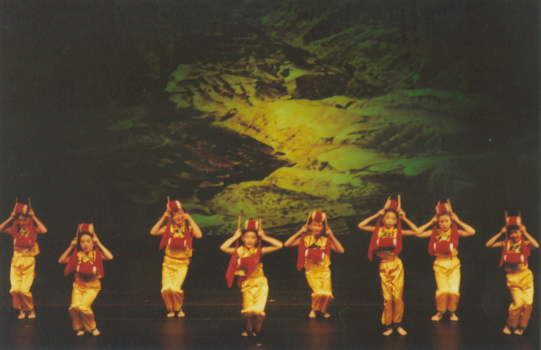 Drums
are a very popular prop in Chinese dance. The rhythmical drum sound and
graceful dance show the uninhibited character of villagers in the northern
Shanxi province and is an expression of their happy and passionate feelings.
In this piece from the Shou-La-Shou Arts Troupe, the children of the Yellow
River Basin hit two drums, one on their chests and the other on top of their
heads, in intricate patterns.
Drums
are a very popular prop in Chinese dance. The rhythmical drum sound and
graceful dance show the uninhibited character of villagers in the northern
Shanxi province and is an expression of their happy and passionate feelings.
In this piece from the Shou-La-Shou Arts Troupe, the children of the Yellow
River Basin hit two drums, one on their chests and the other on top of their
heads, in intricate patterns.
Choreographer: Huang Ying and Wang Rui Fen
Dancers: Kateri Goodwin, Anna Meyer, Christie Sui (leads); Sophie Archer,
Christy Chang, Vera Chang, Madeleine Morgan Lan Harris, Molly Herman-Gallow,
Leslie Lue, Cynthia McIntire, Kate Zahniser-Word
[Top of page]
DRUNKEN
SPRING
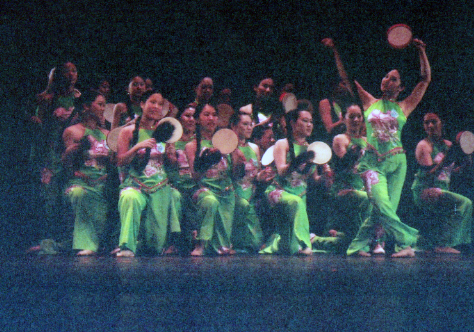 A
group of Chinese Han girls celebrating Chinese New Year use their braids to
beat the drum. They dance cheerfully while drinking wine.
A
group of Chinese Han girls celebrating Chinese New Year use their braids to
beat the drum. They dance cheerfully while drinking wine.
Choreography: Jiang Xi Arts
and Vocational Academy
Lead Dancer: Amanda
Phingbodhipakkiya
Group Dancers: Hoyi Chan,
Emery Chang, Grace Ho, Tzu-Wei Hsu, April Huang, Deanna Joe, Queena Kou, Dana
Lee, Eugenie Ooi, Tiffany Soo, Catherine Stoddard, Sandy Sun, Melissa Ting,
Ginger Tsai, Jennifer Wang, Joann Wang, Penny Wang, Lacey Wen, Kimberly Wu,
Cindy Ye
[Top of page]
CYMBAL DANCE
 Cymbals
are percussion instruments that Chinese dancers have used traditionally for
celebration dances. Carefully coordinating the cymbal with the music
strengthens the spirit of the celebration.
Cymbals
are percussion instruments that Chinese dancers have used traditionally for
celebration dances. Carefully coordinating the cymbal with the music
strengthens the spirit of the celebration.
Choreographer: Hwee-Eng Y.
Lee
Dancers: Catherine Chu
(lead), Stephanie Chi, Karen Ho, Stephanie Hu, Jessica Kouch, Katie Ku, Allison
Kwan, Tiffany Liu, Lindsey Lue, Michelle McIntire, Julia Shyu, Tanya Su, Alice
Yee, Amy Yee
[Top of page]
DRUNKEN DRUM SOLO
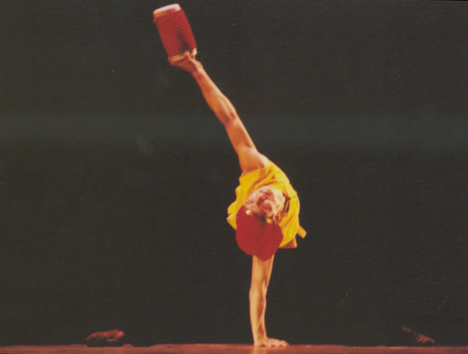
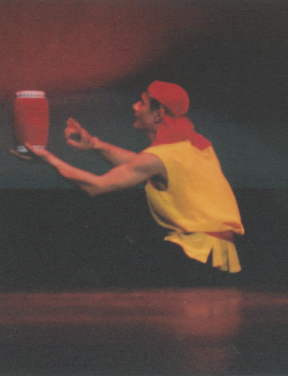 In
ancient times, drums were used to offer sacrifices, fight the enemy, sound
alarms, and give the time. Later, beating drums, along with other
percussion instruments, gradually became a recreational activity for villagers
to pray for favorable crops and a happy life. In this piece, the dancer is
intoxicated with joy.
In
ancient times, drums were used to offer sacrifices, fight the enemy, sound
alarms, and give the time. Later, beating drums, along with other
percussion instruments, gradually became a recreational activity for villagers
to pray for favorable crops and a happy life. In this piece, the dancer is
intoxicated with joy.
Choreographer: Zheng Lin
Dancer: Hangdong Xu (Guest Artist, Dance China NY)
[Top of page]
YELLOW
EARTH
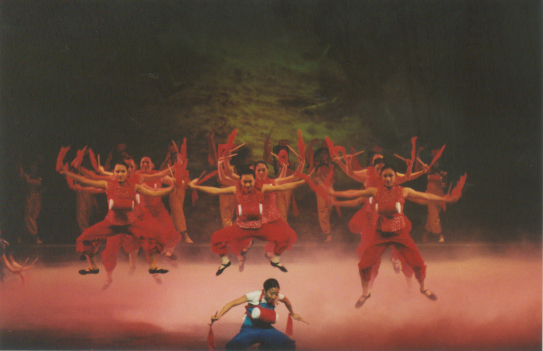
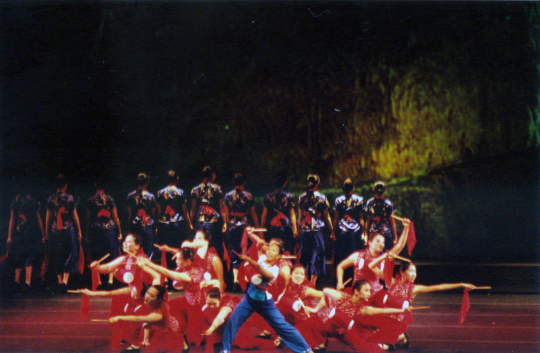 Based on the choreography
of Zhang Jigang, well-known for "1000 Hand Guanyin," performed by the China
Disabled Person's Performing Arts Troupe, "Yellow Earth" depicts peasants who
have worked on China's yellow land for generations. While they are very
poor, they believe that as long as they have a plot of yellow earth, they can
continue to live on in happiness. By endless drum sounds, they show their
love for their yellow land, their strong desire for life, and their hopes for
the future. The daughter joins these Chinese villagers as she finally
comes to terms with where she came from--where her roots were planted more than
5,000 years ago.
Based on the choreography
of Zhang Jigang, well-known for "1000 Hand Guanyin," performed by the China
Disabled Person's Performing Arts Troupe, "Yellow Earth" depicts peasants who
have worked on China's yellow land for generations. While they are very
poor, they believe that as long as they have a plot of yellow earth, they can
continue to live on in happiness. By endless drum sounds, they show their
love for their yellow land, their strong desire for life, and their hopes for
the future. The daughter joins these Chinese villagers as she finally
comes to terms with where she came from--where her roots were planted more than
5,000 years ago.

Staged by Hwee-Eng Y. Lee
after Zhang Jigang
Daughter: Kerry Lee
Group Dancers: Hoyi Chan,
Emery Chang, Grace Ho, April Huang, Tzu-Wei Hsu, Deanna Joe, Queena Kou, Dana
Lee, Eugenie Ooi, Amanda Phingbodhipakkiya, Tiffany Soo, Catherine Stoddard,
Sandy Sun, Melissa Ting, Ginger Tsai, Jennifer Wang, Joann Wang, Penny Wang,
Lacey Wen, Kimberly Wu, Cindy Ye, Hui-Ju Young
Additional Dancers: Sophie
Archer, Christy Chang, Vera Chang, Catherine Chu, Kateri Goodwin, Madeleine
Morgan Lan Harris, Molly Herman-Gallow, Karen Ho, Stephanie Hu, Jessica Kouch,
Katie Ku, Allison Kwan, Tiffany Liu, Leslie Lue, Lindsey Lue, Cynthia McIntire,
Michelle McIntire, Anna Meyer, Julia Shyu, Tanya Su, Christie Sui, Alice Yee,
Amy Yee, Kate Zahniser-Word
[Top of
page]
Introduction
.|.
About
ACDC .|.
Past
Performances
Most
Recent Performance.|
.
Upcoming Performance
.
|.
Chinese
Dance History
Chinese
Dance Classes
Created by the Atlanta Chinese
Dance Company
Copyright reserved.

.jpg) This
Tao Li Cup dance competition award-winning folk dance, of the Han majority
ethnic group (92% of the total population) in China, depicts a young lady who is
pregnant with her first child. She is restless, anxiously counting down
the days as she laughs to herself about the thought of being a mother. The
dancer utilizes the fan as a metaphor for both the child and for the clothes she
is sewing for her child. This dance is in the style of "Yang Ge," which
originated from the movements of farmers.
This
Tao Li Cup dance competition award-winning folk dance, of the Han majority
ethnic group (92% of the total population) in China, depicts a young lady who is
pregnant with her first child. She is restless, anxiously counting down
the days as she laughs to herself about the thought of being a mother. The
dancer utilizes the fan as a metaphor for both the child and for the clothes she
is sewing for her child. This dance is in the style of "Yang Ge," which
originated from the movements of farmers.

.jpg) The
daughter is now a young child, and the mother begins to pass on her Chinese
heritage to her daughter in America. She gives her daughter her toy drum,
her only materialistic possesion from her motherland. The daughter happily
plays with her new toy as she listens to her mother's stories of China.
The
daughter is now a young child, and the mother begins to pass on her Chinese
heritage to her daughter in America. She gives her daughter her toy drum,
her only materialistic possesion from her motherland. The daughter happily
plays with her new toy as she listens to her mother's stories of China. Traditionally,
red is the symbol of happiness. For centuries, the Chinese have taken
great pride in producing beautiful silk ribbons. Ribbon dancing originated
from Chinese opera and has been preserved since the Han dynasty (206 BC-24 AD).
It has since become a Han ethnic tradition, commonly performed at celebrations
such as Chinese New Year.
Traditionally,
red is the symbol of happiness. For centuries, the Chinese have taken
great pride in producing beautiful silk ribbons. Ribbon dancing originated
from Chinese opera and has been preserved since the Han dynasty (206 BC-24 AD).
It has since become a Han ethnic tradition, commonly performed at celebrations
such as Chinese New Year. 
 A
popular Han folk dance originating from the Shandong province in northern China,
this dance is also a type of Yang Ge. The special way of coordinating the
fan and scarf creates the beauty of this Han folk dance. The beauty of
spring is symbolized by the grace of the ladies.
A
popular Han folk dance originating from the Shandong province in northern China,
this dance is also a type of Yang Ge. The special way of coordinating the
fan and scarf creates the beauty of this Han folk dance. The beauty of
spring is symbolized by the grace of the ladies.
 Pandas
are an endangered species. It is a treasure of China. They live in
the bamboo forests of central China. This dance depicts the simple, daily
lives of the adorable pandas.
Pandas
are an endangered species. It is a treasure of China. They live in
the bamboo forests of central China. This dance depicts the simple, daily
lives of the adorable pandas..jpg)
 Inner Mongolians live on the vast prairies in northern
China. Many of the people live as shepherds. Their traditional
culture has a close relationship with sheep, horses, and eagles. In this
Tao Li Cup dance competition award-winning piece, the dancer beats bundles of
chopsticks, a typical prop of traditional Mongolian dance, in intricate patterns
across her body.
Inner Mongolians live on the vast prairies in northern
China. Many of the people live as shepherds. Their traditional
culture has a close relationship with sheep, horses, and eagles. In this
Tao Li Cup dance competition award-winning piece, the dancer beats bundles of
chopsticks, a typical prop of traditional Mongolian dance, in intricate patterns
across her body. The Yi people is one of the 56 minority who mostly live in
the southwestern part of China in provinces such as Sichuan, Yunnan, and
Guangxi. Yi women wear laced or embroidered jackets and pleated long
skirts hemmed with colorful multi-layer laces. They worship fire, and the
torch festival is one of the important customs. The ancestors of the Yi
ethnic group can be traced back to the Qiang people in northwest China.
They have since migrated south and joined the local southwest aborigines to form
the Yi ethnic group as it is known today.
The Yi people is one of the 56 minority who mostly live in
the southwestern part of China in provinces such as Sichuan, Yunnan, and
Guangxi. Yi women wear laced or embroidered jackets and pleated long
skirts hemmed with colorful multi-layer laces. They worship fire, and the
torch festival is one of the important customs. The ancestors of the Yi
ethnic group can be traced back to the Qiang people in northwest China.
They have since migrated south and joined the local southwest aborigines to form
the Yi ethnic group as it is known today. The Dai, one
of the fifty-six minority ethnic groups in China, live mostly in the Yunnan
province, located in southwestern China. Since they live in close
proximity to Myanmar, the style of the Dai dance is influenced by the Burmese.
Bouncy knees and angular arms are special characteristics of this type of dance.
The water sprinkling festival is unique to Dai culture. During the
festival, people carry buckets or basins to splash water on each other. It
is an event that is attended by a large number of people. It is believed
that the more water one is splashed with, the happier one will be. This
dance was originally choreographed for ACDC by a Dai woman Tang Yebi
The Dai, one
of the fifty-six minority ethnic groups in China, live mostly in the Yunnan
province, located in southwestern China. Since they live in close
proximity to Myanmar, the style of the Dai dance is influenced by the Burmese.
Bouncy knees and angular arms are special characteristics of this type of dance.
The water sprinkling festival is unique to Dai culture. During the
festival, people carry buckets or basins to splash water on each other. It
is an event that is attended by a large number of people. It is believed
that the more water one is splashed with, the happier one will be. This
dance was originally choreographed for ACDC by a Dai woman Tang Yebi
 The
Dai depend on the river, where they wash their clothes and bathe. This
leads to their passion for fish. This dance was orginally choreographed
for ACDC by a Dai woman Tang Yebi.
The
Dai depend on the river, where they wash their clothes and bathe. This
leads to their passion for fish. This dance was orginally choreographed
for ACDC by a Dai woman Tang Yebi.
 This
Tao Li Cup award-winning Han dance depicts the beauty of young traditional
Chinese opera ladies. In Chinese opera terminology, "hua dan" represents a
feisty, flirtatious young woman. This dance, in which dancers wear only
one long feather on their heads, is a parody of the long-standing tradition that
female warriors wear two long feathers on their heads
This
Tao Li Cup award-winning Han dance depicts the beauty of young traditional
Chinese opera ladies. In Chinese opera terminology, "hua dan" represents a
feisty, flirtatious young woman. This dance, in which dancers wear only
one long feather on their heads, is a parody of the long-standing tradition that
female warriors wear two long feathers on their heads 
 Th
Th Dunhuang
music and dance developed during the Tang dynasty, one of the richest periods in
Chinese art history. The classical Dunhuang dance style developed during
the introduction of Buddhism into China and shows an Indian influence.
This dance depicts fairies flying in the heavens, watching the people on earth
below.
Dunhuang
music and dance developed during the Tang dynasty, one of the richest periods in
Chinese art history. The classical Dunhuang dance style developed during
the introduction of Buddhism into China and shows an Indian influence.
This dance depicts fairies flying in the heavens, watching the people on earth
below.
 Part
of classical Chinese dance technique comes from traditional Chinese opera.
This dance portrays a traditional heroic Chinese woman. In Chinese opera,
this character typically wears full armor and long feathers in her hat.
Practicing control of the weapon shows her determination to defend her country.
Part
of classical Chinese dance technique comes from traditional Chinese opera.
This dance portrays a traditional heroic Chinese woman. In Chinese opera,
this character typically wears full armor and long feathers in her hat.
Practicing control of the weapon shows her determination to defend her country.
 Butterfly
Lovers' Concerto is often nicknamed the Chinese version of Romeo and Juliet.
In the story, Zhu Yingtai disguised herself as a boy to study in Hangzhou, where
she met Liang Shanbo. They fell in love, but Zhu's father already arranged
for her to marry another man. Liang died of a broken heart, and when Zhu
mourned at Liang's tomb, the tomb burst open due to thunder. Zhu threw
herself into the grave, and the young couple transformed into butterflies in
heaven.
Butterfly
Lovers' Concerto is often nicknamed the Chinese version of Romeo and Juliet.
In the story, Zhu Yingtai disguised herself as a boy to study in Hangzhou, where
she met Liang Shanbo. They fell in love, but Zhu's father already arranged
for her to marry another man. Liang died of a broken heart, and when Zhu
mourned at Liang's tomb, the tomb burst open due to thunder. Zhu threw
herself into the grave, and the young couple transformed into butterflies in
heaven.
 Now
that the daughter is a teenager, she longs to fit in with her American
counterparts. Trading her traditional Chinese outfit for her latest
fashions and her mother's stories for American hip hop music, the girl renounces
her Chinese heritage as an oddity that she wishes to shut out of her mind.
She kicks the toy drum in anger.
Now
that the daughter is a teenager, she longs to fit in with her American
counterparts. Trading her traditional Chinese outfit for her latest
fashions and her mother's stories for American hip hop music, the girl renounces
her Chinese heritage as an oddity that she wishes to shut out of her mind.
She kicks the toy drum in anger.
.jpg) Just
as the daughter begins to mature, her mother passes away, leaving the daughter
pondering everything her mother taught her about China. She goes back to
the drum, the symbol of her mother's love and only connection to her homeland.
Determined to seek the answers to all of the questions she never bothered to ask
and to fully understand everything the drum embodies, she vows to travel to
China to see firsthand what her mother spent a lifetime trying to teach her.
This dance incorporates ballet and modern dance with Chinese dance to reflect
the daughter's influences from both western and eastern cultures.
Just
as the daughter begins to mature, her mother passes away, leaving the daughter
pondering everything her mother taught her about China. She goes back to
the drum, the symbol of her mother's love and only connection to her homeland.
Determined to seek the answers to all of the questions she never bothered to ask
and to fully understand everything the drum embodies, she vows to travel to
China to see firsthand what her mother spent a lifetime trying to teach her.
This dance incorporates ballet and modern dance with Chinese dance to reflect
the daughter's influences from both western and eastern cultures. Drums
are a very popular prop in Chinese dance. The rhythmical drum sound and
graceful dance show the uninhibited character of villagers in the northern
Shanxi province and is an expression of their happy and passionate feelings.
In this piece from the Shou-La-Shou Arts Troupe, the children of the Yellow
River Basin hit two drums, one on their chests and the other on top of their
heads, in intricate patterns.
Drums
are a very popular prop in Chinese dance. The rhythmical drum sound and
graceful dance show the uninhibited character of villagers in the northern
Shanxi province and is an expression of their happy and passionate feelings.
In this piece from the Shou-La-Shou Arts Troupe, the children of the Yellow
River Basin hit two drums, one on their chests and the other on top of their
heads, in intricate patterns. A
group of Chinese Han girls celebrating Chinese New Year use their braids to
beat the drum. They dance cheerfully while drinking wine.
A
group of Chinese Han girls celebrating Chinese New Year use their braids to
beat the drum. They dance cheerfully while drinking wine. Cymbals
are percussion instruments that Chinese dancers have used traditionally for
celebration dances. Carefully coordinating the cymbal with the music
strengthens the spirit of the celebration.
Cymbals
are percussion instruments that Chinese dancers have used traditionally for
celebration dances. Carefully coordinating the cymbal with the music
strengthens the spirit of the celebration.
 In
ancient times, drums were used to offer sacrifices, fight the enemy, sound
alarms, and give the time. Later, beating drums, along with other
percussion instruments, gradually became a recreational activity for villagers
to pray for favorable crops and a happy life. In this piece, the dancer is
intoxicated with joy.
In
ancient times, drums were used to offer sacrifices, fight the enemy, sound
alarms, and give the time. Later, beating drums, along with other
percussion instruments, gradually became a recreational activity for villagers
to pray for favorable crops and a happy life. In this piece, the dancer is
intoxicated with joy.
 Based on the choreography
of Zhang Jigang, well-known for "1000 Hand Guanyin," performed by the China
Disabled Person's Performing Arts Troupe, "Yellow Earth" depicts peasants who
have worked on China's yellow land for generations. While they are very
poor, they believe that as long as they have a plot of yellow earth, they can
continue to live on in happiness. By endless drum sounds, they show their
love for their yellow land, their strong desire for life, and their hopes for
the future. The daughter joins these Chinese villagers as she finally
comes to terms with where she came from--where her roots were planted more than
5,000 years ago.
Based on the choreography
of Zhang Jigang, well-known for "1000 Hand Guanyin," performed by the China
Disabled Person's Performing Arts Troupe, "Yellow Earth" depicts peasants who
have worked on China's yellow land for generations. While they are very
poor, they believe that as long as they have a plot of yellow earth, they can
continue to live on in happiness. By endless drum sounds, they show their
love for their yellow land, their strong desire for life, and their hopes for
the future. The daughter joins these Chinese villagers as she finally
comes to terms with where she came from--where her roots were planted more than
5,000 years ago.